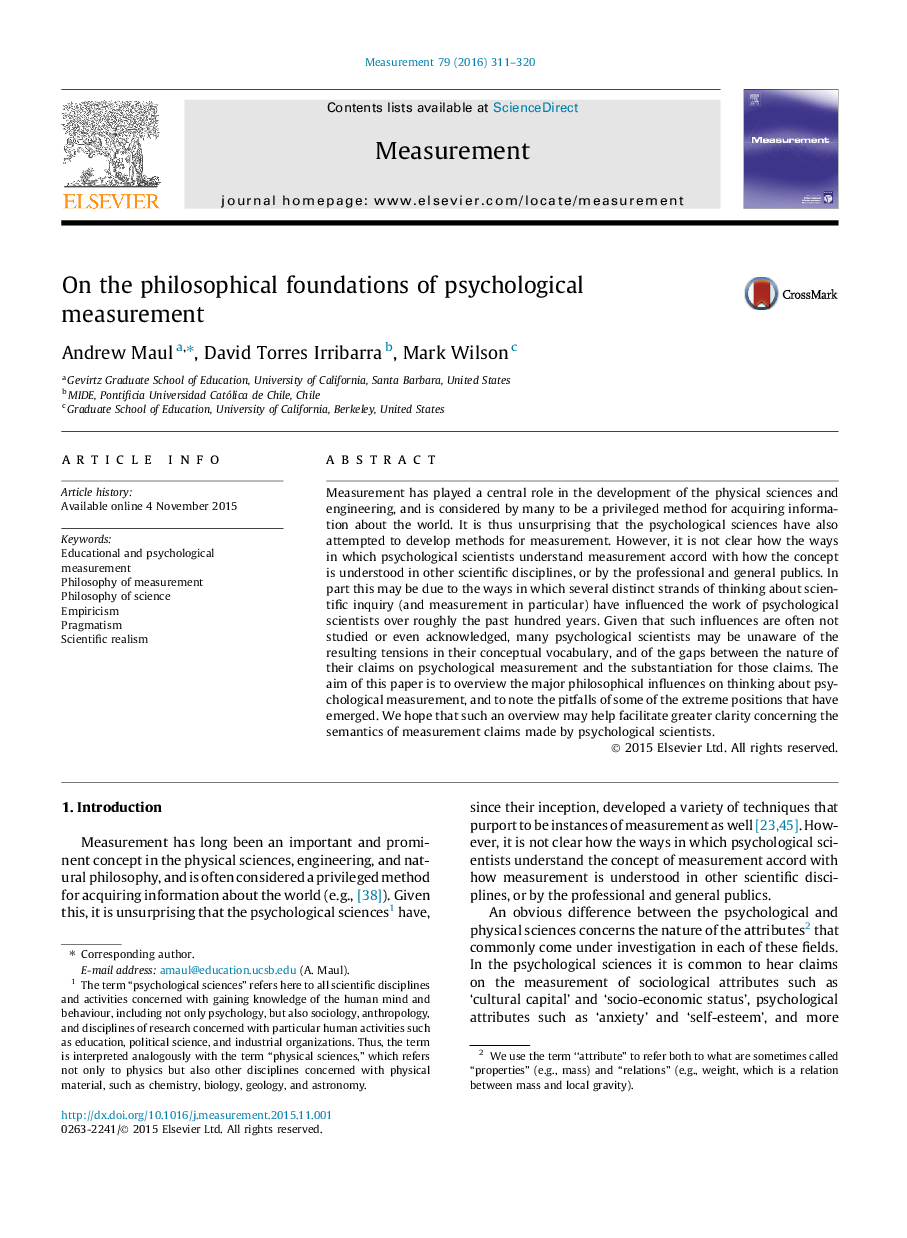| کد مقاله | کد نشریه | سال انتشار | مقاله انگلیسی | نسخه تمام متن |
|---|---|---|---|---|
| 7124385 | 1461508 | 2016 | 10 صفحه PDF | دانلود رایگان |
عنوان انگلیسی مقاله ISI
On the philosophical foundations of psychological measurement
ترجمه فارسی عنوان
در مبانی فلسفی اندازه گیری روانی
دانلود مقاله + سفارش ترجمه
دانلود مقاله ISI انگلیسی
رایگان برای ایرانیان
کلمات کلیدی
اندازه گیری آموزشی و روانی، فلسفه اندازه گیری، فلسفه علم، تجربی پراگماتیسم، واقع گرایی علمی،
ترجمه چکیده
اندازه گیری نقش مهمی در توسعه علوم فیزیکی و مهندسی ایفا کرده است و بسیاری از آنها به عنوان یک روش ممتاز برای کسب اطلاعات در مورد جهان شناخته شده اند. بدین ترتیب بی نظیر است که علوم روانشناختی نیز تلاش کرده اند روش های اندازه گیری را توسعه دهند. با این حال، روشن نیست که چگونه شیوه هایی را که دانشمندان روانشناختی درک می کنند درمورد سازگاری با این که چگونه این مفهوم در سایر رشته های علمی یا حرفه ای و عموم مردم درک می شود، روشن نیست. بخشی از این ممکن است به علت راه هایی باشد که چندین رشته مجزا تفکر در مورد تحقیقات علمی (و مخصوصا اندازه گیری) بر کار دانشمندان روان شناسی تا حدود صد سال گذشته تأثیر داشته است. با توجه به این که اغلب چنین تأثیرات مورد مطالعه و یا حتی تصدیق نمی شود، بسیاری از دانشمندان روانشناختی ممکن است از تنش های ناشی از واژگان مفهومی و شکاف بین ماهیت ادعاهای خود درباره اندازه گیری روحی و محکومیت این ادعاها بی اطلاع باشند. هدف این مقاله بررسی تاثیرات فلسفی عمده در تفکر در مورد اندازه گیری روانشناختی و توجه به اشتباهات برخی از موقعیت های شدید است. ما امیدواریم که چنین نظری بتواند وضوح بیشتری در مورد معانی سنجش ادعاهای اندازه گیری شده توسط دانشمندان روانشناختی ایجاد کند.
موضوعات مرتبط
مهندسی و علوم پایه
سایر رشته های مهندسی
کنترل و سیستم های مهندسی
چکیده انگلیسی
Measurement has played a central role in the development of the physical sciences and engineering, and is considered by many to be a privileged method for acquiring information about the world. It is thus unsurprising that the psychological sciences have also attempted to develop methods for measurement. However, it is not clear how the ways in which psychological scientists understand measurement accord with how the concept is understood in other scientific disciplines, or by the professional and general publics. In part this may be due to the ways in which several distinct strands of thinking about scientific inquiry (and measurement in particular) have influenced the work of psychological scientists over roughly the past hundred years. Given that such influences are often not studied or even acknowledged, many psychological scientists may be unaware of the resulting tensions in their conceptual vocabulary, and of the gaps between the nature of their claims on psychological measurement and the substantiation for those claims. The aim of this paper is to overview the major philosophical influences on thinking about psychological measurement, and to note the pitfalls of some of the extreme positions that have emerged. We hope that such an overview may help facilitate greater clarity concerning the semantics of measurement claims made by psychological scientists.
ناشر
Database: Elsevier - ScienceDirect (ساینس دایرکت)
Journal: Measurement - Volume 79, February 2016, Pages 311-320
Journal: Measurement - Volume 79, February 2016, Pages 311-320
نویسندگان
Andrew Maul, David Torres Irribarra, Mark Wilson,
